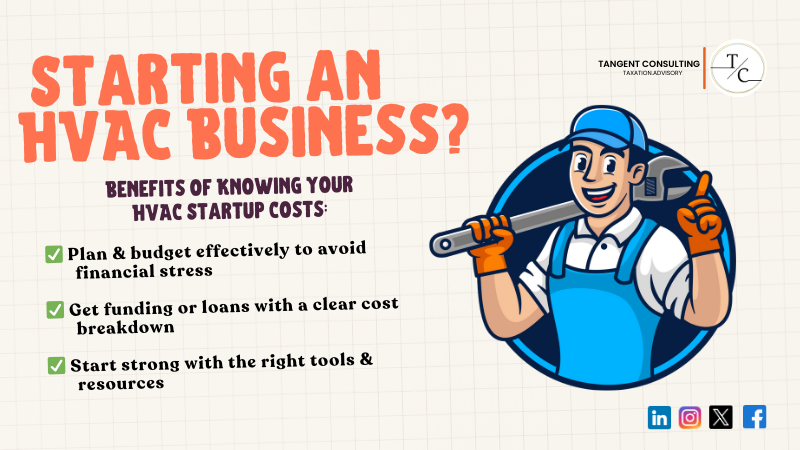What’s The HVAC Business’s Initial Investment?
What’s The HVAC Business’s Initial Investment?

At Tangent, we are sneakerheads. We would be ready to spend a few hundred bucks on a pair of limited-edition kicks. It seems wild that you are spending so much on sneakers.
But sneakerheads know it’s an investment. The right pair can appreciate it and make a statement, and last year, if you take good care of it (at least that is what we think).
Running an HVAC business is a lot like sneakers. You’re investing in equipment, licenses, and marketing. But what’s the HVAC business’s initial investment?
Let’s break down the total cost and how you can get that initial investment.

HVAC Business Initial Investment: What’s the Real Cost?
On average, the HVAC business’s initial investment is between $10,000 to $50,000. However, the actual number depends on factors like your business size, location, and services offered.
So, where’s all that money going? Let’s break down the key costs.
1. HVAC Business Registration and Licensing
Before you book your first client, you’ll need to register your business and get the necessary licenses. Costs vary by location, but expect to set aside at least $500 to $1,000 to cover permits, registration fees, and any state-specific HVAC certifications.
2. HVAC Business Insurance
Imagine installing a brand-new system, only to have a mishap damage a client’s property. Business insurance isn’t optional; it’s essential. Costs range from $500 to $2,000 per year, depending on coverage and business size.
3. Company Vehicle
You can’t lug HVAC units on a bicycle. Whether you buy or lease, a reliable work vehicle is a must. Besides the initial cost (anywhere from $5,000 to $10,000 per year), don’t forget fuel, maintenance, and repairs.
4. HVAC Equipment
You won’t go far without the right gear. Expect to invest $5,000 to $10,000 in essential equipment like:
- Wrenches
- Screwdrivers
- Drill
- Tape measure
- Pipe cutter
Reminds us of a quote from Charlie Munger’s Poor Charlie’s Almanac. “The company that needs a new machine tool and hasn’t bought it is already paying for it”.

5. Hiring HVAC Technicians
If you’re not handling every job yourself, you’ll need to hire certified technicians. Costs vary, but expect to budget for:
- Salaries
- Benefits
- Insurance
- Ongoing training
Hiring the right team isn’t cheap, but it’s the backbone of a successful HVAC business.
6. Marketing
A great HVAC business means nothing if no one knows you exist. You’ll need a solid marketing plan, including a website, business cards, and ads. The cost depends on your strategy, but combining online (Google Ads, SEO, social media) and offline (flyers, networking, direct mail) marketing will stretch your budget further.

How to Finance Your HVAC Business?
So far, you know that starting an HVAC business isn’t cheap, and you need considerable investment. The good news is you don’t have to empty your savings. There are plenty of financing options to help you secure the capital you need.
Let’s explore the best ways to fund your HVAC business.
1. Small Business Loans
If you need a part of capital upfront, small business loans are one of the most common ways to fund your HVAC startup. Some of the best options include:
SBA 7(a) Loans
These government-backed loans offer favorable terms, low interest rates, and long repayment periods, making them a solid choice for HVAC businesses needing working capital, equipment financing, or even real estate.
Traditional Bank Loans
Banks offer larger funding amounts, but you’ll need a strong credit score and collateral to qualify.
Business Lines of Credit
A flexible financing option where you borrow what you need and pay interest on the amount used—great for covering unexpected expenses.
Microloans
If you need just a small amount to get started, microloans (ranging from $500 to $50,000) can be an easier way to access funds with fewer strict qualification requirements.

2. Government Grants and Programs
Who doesn’t love free money? While they’re not always easy to get, government grants and programs provide financial assistance without the burden of repayment. Some grants are available through federal, state, or local government programs, while others come from private foundations supporting small businesses.
To find grants:
- Check the U.S. Small Business Administration (SBA) website for available programs.
- Look into energy efficiency and green business grants. Some HVAC companies qualify for funding due to their work in sustainable energy solutions.
- Explore local business development programs that offer grants or low-interest loans for new businesses.
3. Personal Savings and Investments
If you prefer to avoid debt altogether, dipping into personal savings or getting help from family and friends can be a way to finance your HVAC business. This approach, known as bootstrapping, has its advantages:
- No loan approvals or credit checks
- No interest payments eating into your profits
- Full control over your business
Final Thoughts
We’ve broken down your biggest expenses, from licensing and equipment to marketing and financing options. Now, it’s up to you to map out your budget, choose the best funding strategy, and take that first step toward building a profitable HVAC business.
With the right financial planning, your business will be up and running in no time. If you don’t like this financial jargon, why not let someone else handle it?
Tangent Consulting has years of experience as a CFO, business coach, and tax consultant. With us, you don’t need to hire an accountant or business coach separately; you can get both in one place.
P.S. If you are reading this, it means you can have access to our free consultation for your business. Avail this for free today before we change our mind 😉
FAQs
1. How profitable is an HVAC business?
An HVAC business can be highly profitable, with gross profit margins ranging from 35% to 50% depending on location, services, and efficiency.
2. Who makes the most money in HVAC?
HVAC business owners and specialized technicians like HVAC engineers or commercial system experts earn the most.
3. How big is the HVAC market?
The global HVAC market is valued at over $200 billion, with steady annual growth driven by climate change, energy efficiency demands, and smart technology advancements.
